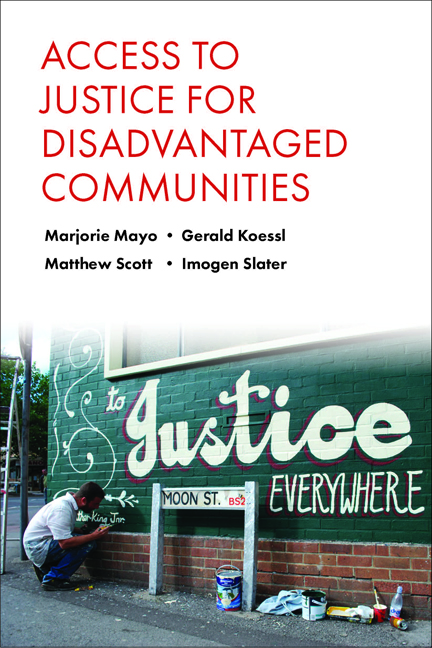Book contents
- Frontmatter
- Dedication
- Contents
- Acknowledgements
- Abbreviations and glossary
- Introduction: accessing social justice in disadvantaged communities
- one Social justice and the welfare state
- two Concepts of justice and access to justice
- three Ethos and values
- four Challenges and dilemmas
- five Public service modernisation, restructuring and recommodification
- six Conflict and competition versus collaboration and planning
- seven Public service modernisation and time
- eight Alienation and demoralisation, or continuing labours of love?
- nine Access to social justice for disadvantaged communities: value and values
- Appendix 1 Research methodology and questionnaire
- Appendix 2 Law Centres included
- Appendix 3 Topic guides for semi-structured interviews
- References
- Index
two - Concepts of justice and access to justice
Published online by Cambridge University Press: 01 February 2022
- Frontmatter
- Dedication
- Contents
- Acknowledgements
- Abbreviations and glossary
- Introduction: accessing social justice in disadvantaged communities
- one Social justice and the welfare state
- two Concepts of justice and access to justice
- three Ethos and values
- four Challenges and dilemmas
- five Public service modernisation, restructuring and recommodification
- six Conflict and competition versus collaboration and planning
- seven Public service modernisation and time
- eight Alienation and demoralisation, or continuing labours of love?
- nine Access to social justice for disadvantaged communities: value and values
- Appendix 1 Research methodology and questionnaire
- Appendix 2 Law Centres included
- Appendix 3 Topic guides for semi-structured interviews
- References
- Index
Summary
Before focusing upon the development of legal aid and the history of Law Centres, more specifically, this chapter starts by summarising different definitions and perspectives on social justice and their varying implications for social welfare. Among others, Piachaud has pointed to ‘the very ambiguity of the term “social justice” – a “feel good” term that almost all can subscribe to’ (Piachaud, 2008, p 33). While the pursuit of social justice ‘has been the driving force behind much, perhaps most, social change’, in Piachaud's view (Piachaud, 2008, p 50), ‘opinions about what is fair and just have differed, and will probably always do so’, he concludes.
Although similarities have been identified, there have also been significant differences of approach, both in theory and in practice. There has been widespread agreement about the importance of basic political liberties and fair process, together with widespread agreement about the importance of social rights, such as access to education, if citizens are to benefit from political rights, as Marshall argued (Marshall, 1950). But there has been far less agreement about what, if any, inequalities would be justifiable, and on what basis.
Rawls’ A theory of justice (Rawls, 1971) has been centrally significant here as an influence on subsequent debates, sparking criticisms from varying perspectives. Deriving his arguments from processes of reasoning – as to what principles we would choose if we did not know what our own position and life chances were going to be – Rawls himself claimed that his conception of the principles of justice stood independently of any particular moral or religious views. He summarised the outcomes of these processes of reasoning as follows: ‘All social primary goods – liberty and opportunity, income and wealth, and the social bases of self-respect – are to be distributed equally unless an unequal distribution of any, or all, of these goods is to the advantage of the least favoured’ (Rawls, 1971, p 73). This was an argument not for defining justice in terms of absolute equality but, rather, that insofar as the outcomes were unequal, these inequalities could be justified according to Rawls’ criteria. In his view, such an approach could form the basis for developing strategies for the promotion of justice across different types of societies. Or could it?
Rawls himself was focusing upon the rules for society as a whole, rather than upon the rules underpinning individual choices.
- Type
- Chapter
- Information
- Access to Justice for Disadvantaged Communities , pp. 19 - 34Publisher: Bristol University PressPrint publication year: 2014



